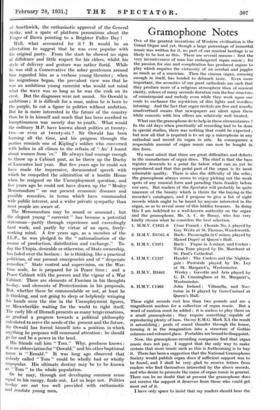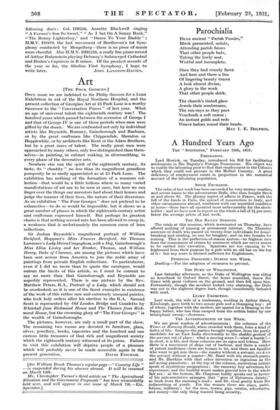Gramophone Notes
ONE of the greatest inventions of Western civilization is the Grand Organ and yet, though a large percentage of immortal music was written for it, no part of our musical heritage is so likely to be lost as this. There are several reasons : first the very inventiveness of man has endangered organ music ; for the passion for size and complication has produced organs to play which requires the virtuosity of an acrobat and juggler as much as of a musician. Then the cinema organ, amusing enough in itself, has tended to debauch taste. Even more important, the acoustics of our great cathedrals are such that they produce more of a religious atmosphere than of musical clarity, echoes of many seconds duration ruin the fine structure of counterpoint and melody even while they work upon our souls to enchance the mysticism of dim lights and wordless intoning. And the fact that organ recitals are free and usually unadvertised means that newspapers are silent upon them while concerts with box offices are relatively well treated.
What can the gramophone do to help in these circumstances ? In the old days when practically all recording had to be done in special studios, there was nothing that could be expected ; but now all that is required is to set up a microphone in any cathedral and record its organ in situ. In consequence a respectable amount of organ music can now be bought in disc form.
We must admit that there are great difficulties and defects
in the manufacture of organ discs. The chief is that the bass register descends to a point far below what can as yet be reproduced and that this pedal part of the organ is its most admirable quality. There is also the difficulty of the echo ; the gramophone always seems to enjoy picking out the weak spots of any musical form and parading them frankly before our ears. But readers of the Spectator will probably be quite unaware of the beauty which is theirs for the buying in the recorder's catalogues, and I propose to give a list of eight records which ought to be heard by anyone interested in the organ, so as to reveal some of this hidden treasure. In doing this I am indebted to a well-known authority on the organ and the gramophone, Mr. A. C. de Busay, who has very kindly chosen what he considers the best selection.
1. H.M.V. C1825-6 Cesar Franck : Chorale No. 1, played by Guy Weitz at St. Thomas, Wandsworth. Bach: Passacaglia in C minor, played by Marcel Dupre at Queen's Hall.
Bach : Fugue in A minor, and Cocker : Tuba Tune played by Dr. Marchant at St. Paul's Cathedral.
Handel : The Cuckoo and the Nightin- gale: Pastorale played by Dr. Ley at St. Margaret's, Westminster. Wesley : Gavotte and Aria played by G. D. Cunningham at St. Margaret's, Westminster.
6. H.M.V. C1466 John Ireland : Villanella, and Noc- turne in D played by Goss-Custard at Queen's Hall.
These eight records cost less than two pounds and are a magnificent nucleus for a collection of organ music. But a *Ord of caution must be added ; it is useless to play them on a small gramophone ; they require something capable of reproducing plenty of bass. On my E.M.G. Mark XA the result is astonishing ; peals of sound thunder through the house, turning it in the imagination into a structure of Gothic columns and coloured glass. Portables are bound to disappoint.
Now, the gramophone-recording companies find that organ
music does not pay. I suggest that the only way to make certain that More music such as this is forthcoming is to buy it. There has been a suggestion that the National Gramophone Society would publish organ discs if sufficient support was to be found, and I shall be very glad to receive letters from readers who find themselves interested by the above records, and who desire to promote the cause of organ music in general. There can be no doubt that at present the gramophone does not receive the support it deserves from those who could get
Most out of it. • have only space to insist that my readers should hear the 2. H.M.V. D1765-6 8. H.M.V. C1971 4. H.M.V. C1537 5. H.M.V. B3483
following discs : Col. DB336, Annette Blackwell singing "A Farmer's Son So Sweet," "As I Sat On A Sunny Bank," "The Bonny Lighterboy," and "Dance To Your Daddy" ; H.M.V. D1870, the last movement of Beethoven's 1st Sym- phony conducted by Mengelberg—there is no piece of musks more cheerful. Also H.M.V. DB1258, a really fine piano record of Arthur Rubenstein playing Debussy's Submerged Cathedral and Brahm's Capriccio in B minor. Of the greatest records of the year so far, the Sibelius First Symphony, I hope to












































 Previous page
Previous page